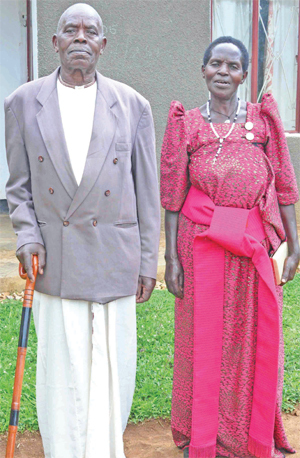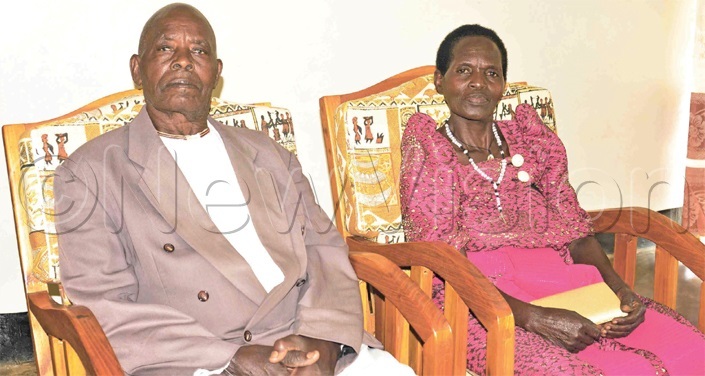Mrs Lwanga raised 10 step children
'' I accepted everything that came with marrying Lwanga. I was concentrating on making our life together a happy one and raising our children well.”
It is rare to find a second wife who raises her husband's children, as though they were her own. Meet Ssalongo Marseille Lwanga's family, which brings hope to those who fear to remarry.

The children say they are proud of their new mother. Lwanga remarried after his first wife, Maria Santurnina Nansamba, died while giving birth. They had 10 children.
Visiting Ssalongo's home at Jjongoza village in Kyotera district, one cannot tell that Maria Gonzaga Nalubega Nnalongo is not the biological mother of Nansamba's children.
In an interview with Saturday Vision, Lwanga, said: "When trouble befalls you, kneel down and pray. God will give you a solution. He will do a miracle for you."
I wedded my fi rst wife on October 3, 1956 at Narozari Catholic Parish in Masaka Diocese. God blessed us with 10 children: Magdalene Tulina-omubezi, Rev. Fr. Aloysious Bukenya, Vincent Mulindwa, Maria Gorretti Nakaaki, Francisco Mbazi
Mugumya, Rev. Fr. Ambrose Bwangatto, Alex Lwanga, Ponsiano Mulindwa, Margaret
Nakachwa and Rev. Fr. John Baptist Musiitwa.
My wife passed away on February 27, 1980 when she was giving birth. The baby also died in the process.
After her death, I remained at home and raised the children. Some were not yet of school-going age. The eldest was in Senior
Two and others were in primary school. I put everything in God's hands, knowing that God would not give me a cross that I
would not carry.
I told him to help me raise my children well. Several people felt sorry for me and wondered how I would look after the children without a wife.
Some of my relatives offered to keep some of my children, to which I obliged. I committed everything in God's hands and with all my mind, I concentrated on looking after the children.
LWANGA MEETS SECOND WIFE
Almost a year later, while at a burial, a friend, Joseph Ssamula, told me that my sister at Kabuwoko wanted to see me. I
passed by her home on my way from the burial. She advised me to remarry.

At the time, the idea of marriage had not crossed my mind. I hoped that I would manage by relying on relatives. I did not think there was any woman who could adequately look after my children, like their mother would.
However, whenever I lay on my bed, I told God to give me guidance. My prayers were answered.
REMARRIAGE
A few months down the road, Lwanga and Nalubega were wed at Kabuwoko Catholic Parish.
"It is now 40 years since I re-married. Nalubega and I have had eight children, including twins. One of the children is a
nun of the congregation of Sisters of Mary Reparatrix. My wife has raised my children well, without discriminating against any and they are all proud of her. I have never heard any of them complain," Lwanga says.
"Nnalongo Nalubega is humble and respectful. I found a comforter; a kind hardworking and loving wife. And, surprisingly, I got her from the same clan as that of my first wife," he adds.
ADVICE TO MEN
Lwanga urges men who want to remarry to pray to God for guidance.
"Additionally, respect yourself. Give your children the best you can and wait on God to deliver you," he adds.
WHO IS LWANGA?
Lwanga was born in Kikondo-Kyango, Ssabagabo, Kalisizo sub-county on September 5, 1935 to Ambrose Bwangatto and Maria
Sarah Alirwaaliraba.
EDUCATION
"I started with catechism at Kyango at the age of eight and soon after my first communion, I started last commitment (omugigi) in 1946
for one year and completed on March 19, 1947," Lwanga says.

"The following year, in April, I started Class One at Kabuwoko. We used to walk about 5km from home to school. My teachers
were Joseph Kayemba from Kagezi, Gorigori Ntala, Cyprian Mukasa (the father of Katikkiro Charles Peter Mayiga), who taught me in Class Three, Joseph Museze, Luka Bannabakintu and Paul Lukwago, my class teacher in Class Six," he adds.
"When I was in Class Six, I was given an opportunity to teach my fellow pupils of Class Two. I attained Grade One, together with Francis Nduggwa, Expedict Nswa and Bernard Mukasa," Lwanga says.\
"After Class Six, priests of Kabuwoko, including Fr Lawrence Walakira, wanted to take me to other schools, but my father refused, as he wanted me to take care of his land. Fr Walakira pleaded with my father to let me go, but he refused. I wanted to escape, but I realised that it would not be wise to go without the blessing of my parents," he narrates.
SERVICE
"Later, I got a sewing machine and I started tailoring at Bukobogo. Thereafter, I started dealing in groundnuts, beans and sorghum and joined a co-operative. I was elected the chairperson of Kyango-Butateganya Cooperative Society," Lwanga says.
"I was later elected the vice-chairperson of our village. In 1964, I became omwami and in 1971-1972, I was omutongole of Kyango, Kisuku sub-county, working with Tarsis Ssentume. Later, I became a catechist. I served for 38 years and retired in 2018," he says.
"My father and four of my uncles — Bernard Lugudde (Buyaya, Kawuba in Mitala- Maria parish in Kampala Archdiocese),
Yikini Wokulira (Kasozi parish), Ambrose Basesagwaka (Kikondo) and Alexandra Teketwa (Bbale, Narozari) — were catechists," he said.
Lwanga adds: "I was always inspired by the devotion of the Christians. I was motivated to be a catechist by a desire to help the priests serve the people and help them to have a relationship with Jesus Christ and the Church."
"At the time, I was very energetic and passionate. But, when the parish priest of Matale asked if I would teach, I was dumbfounded. I did not think I was holy enough to do the job. But I agreed to do it and it became one of the most enriching
and rewarding experiences of my life. It has deepened my faith," he says.
"After attending a retreat, I felt empowered to use the new-found knowledge to help others in our sub-parish. We have an obligation to guide the next generation. I believe we are at our best when we support each other as part of a community," Lwanga says.
Guiding children through their first Holy Communion is one of the memories that Mzee Lwanga cherishes.
He says: "Being a catechist has brought me joy. I have met many amazing people, watched them receive their fi rst sacraments and witnessed their faith grow. My own relationship with God has become more vibrant and meaningful. I have made friends that share the values and faith that I hold so dear. And although I am the one teaching, I am learning too."
NALUBEGA TELLS HER STORY
Narrating her story with a smile, Nnalongo Nalubega says her marriage is a blessing.
"Before I married Lwanga, I was at home looking after my mother. One day, a woman from my village told me that she wanted me to get married to Lwanga. Before our wedding, I was discouraged by several people who told me not to get married to a widower.
However, I knew that this was a man who could be trusted to stay, for better or worse. I decided that, perhaps, I could be
in a happy marriage, if Lwanga was happy, too. Maybe, he would have had a gentler life had she (his first wife) lived. I always remind myself that I owe it to him to do as good a job of taking care of him as she would have."
"At first, I feared and was discouraged. Uncertainty kept ringing in my mind and no one seemed to have kind words for me. Many people told me that I would not manage to look after a widower and his children."
"However, I took my chance and told the doubters that if the marriage failed, I was young and would return home. But, 40
years down the road, I am still here."
"His children were humble, disciplined and respectful. They did not roam about and, whenever they wanted to go and play football, they sought permission. They are respectful and we have a beautiful bond."
"Before I got married to Lwanga, I had one child of my own and was looking after my nieces and nephews. Most of them
were raised together with our children at Ssalongo's home. I thank him for loving
them."
"I had to learn to ignore those who attempted to poison my mind. When someone told me about my husband's first
wife's death, I would politely say: "Yes, my
husband has told me all about it and it was a terrible time.
" I accepted everything that came with marrying Lwanga. I was concentrating on making our life together a
happy one and raising our children well."
"I found the children young, but they knew what had happened and it was tough on them. Losing a mother is a very hard experience for children. I knew that I had suddenly become a mother and had to stand for the children. I was anxious
that the children needed professional help and would be resentful to me.
I expected to hear phrases like: "You are not our mother." But I have never heard anything like that."
"The important thing to remember as a step mother is to never get between the father and his children. I made sure that I
do not put him in a position where he has to take sides. I did not want our children to blame me for creating a rift between them
and their father."
"I am happy because all the children I found at home have fulfi lled their dreams. The last born was ordained a priest last year, at Kitovu in Masaka.
We have enjoyed the weddings of our children and I am still praying for the others also to achieve their dreams, too. Now the older children are supporting their younger siblings. I thank God."
ABOUT NALUBEGA
Nalubega was born on April 21, 1956, to Susan Nannyonga and Vincencio Lubega of Kabuwoko. She is the third in a family
of six children.